
You are reading:

You are reading:
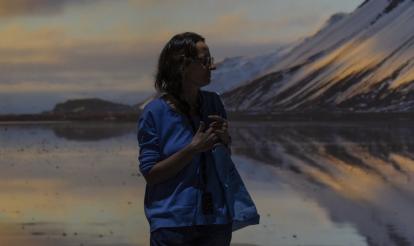
04.11.25
8 minutes readA group of carers visits the immersive exhibition Root for Nature at CaixaForum Barcelona. The experience offers them something daily life often denies them: a pause, a sense of perspective, and the reassurance that they are not alone. The activity, part of the Culture for All initiative in collaboration with the social programmes of the ”la Caixa” Foundation, reminds them that culture is not a luxury, but a right.
In the CaixaForum reception area, small groups chat quietly, their gestures gentle and reserved. Some already know one another; others do not. “It’s my first time here,” says someone in one group. “Whenever I can, I never miss it,” replies another voice. “I’ve come before, the first time was fantastic,” adds a third.
They are carers – most of them women around the age of sixty – who take part in the School for Carers, an initiative of the Comprehensive care for people with advanced illnesses programme run by the ”la Caixa” Foundation. So far, the School has provided training and support to nearly 10,000 people, including family carers and programme volunteers.
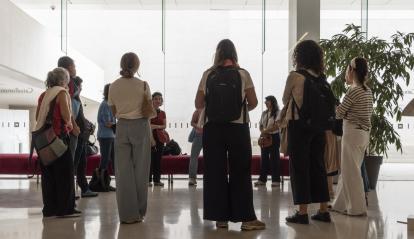
Today, they have been invited to enjoy a different kind of experience: visiting an immersive exhibition that will allow them, if only for a few hours, to disconnect from the relentless clock of caring.
The activity forms part of Culture for All, an initiative that for several years has been working to break down barriers and make culture accessible to those who need it most, people who, at some point in their lives, find themselves in vulnerable situations. These include bereaved teenagers, older people experiencing loneliness, individuals in the process of finding work, single mothers and their children living in poverty, people nearing the end of their lives, or, as in this case, unpaid carers.
After a brief round of introductions – shy, but good-humoured – a CaixaForum educator leads the group up to the first floor. There begins the tour of Root for Nature, a new audiovisual installation never before shown in Spain, which invites visitors to reflect on biodiversity, the interdependence of ecosystems and the urgent need to protect the planet.
“I won’t be talking much,” the educator warns, adding, “This exhibition is different from others, you have to feel it.” And that’s exactly what they do. The group moves down a dimly lit corridor and, behind a curtain, encounters the first burst of imagery. A large room with 360-degree projections fills with images of animals and landscapes from around the world. When the floor becomes virtually flooded with waves, one of the carers pretends to walk on the sea. “It makes you want to take your shoes off and walk on the water,” she says with a smile. “It really feels like you’re there.”
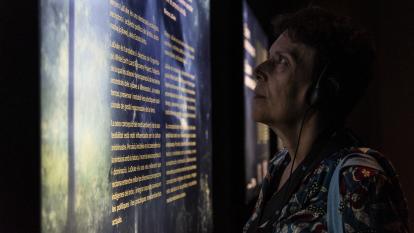
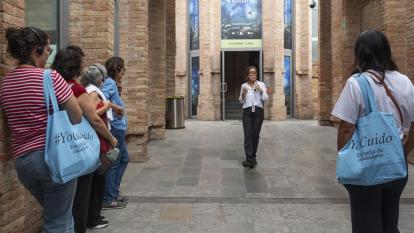
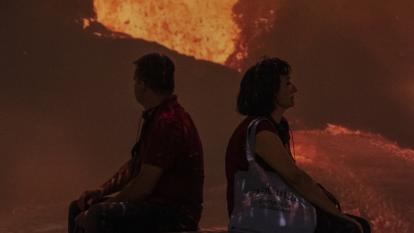
In the second room, the tone shifts. The images become abstract, digital artworks evoking universes, cells, or interconnected organisms, as if the group were walking through the inside of a microscope. A message on the screen reads: “Our vision of the world shapes our actions,” something that resonates with several participants, like Inma, who cared for someone over the course of a decade. “It makes me think about the need to change perspective and take a step back from everyday life,” she explains, “to step out of that tunnel vision we get so used to.” Rosa, another attendee, nods in agreement: “It reminds us that we’re all made of the same stuff.”
The third room brings the visit to a close with a breath of hope. Striking images of nature are interwoven with footage of projects working to protect it. The message is clear: by working together, a better planet is possible. It’s a message that resonates deeply with the carers, allowing them to leave the exhibition with a feeling of “optimism and hope.”
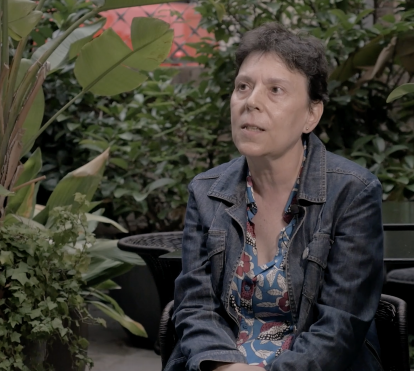
The visit leaves the participants with impressions that are hard to put into words. “I wanted to spread my arms and fly with the birds.” “It’s so powerful, you experience it in such an intense way.” “It makes you feel so many things.”
“I felt like dancing,” admits Sonia, who cares for her mother. “If we could just relax and let go of our inhibitions, I’m sure we’d move to the rhythm of the music, like a leaf swaying in the wind.”
Later, in the café, where the participants gather over coffee to chat about the experience, some recall the projections of foxes, jungles and butterflies. But Inma knows exactly which image stayed with her: that of a wolf she felt was watching her. “I turned my head and there it was, huge. I felt as if it looked straight at me for a few seconds, and then it disappeared. That gaze made me think about how we care for one another, about the wolf’s interdependence with its surroundings, and ours with the biosphere.”
“How beautiful that you saw care in a wolf,” says Marta Gutiérrez, a psychologist and teacher at the School for Carers, who accompanied them. “I felt the same when I saw the whale with her calf.” Others share their own images and interpretations, because artistic experiences like this one spark the imagination and suggest unexpected connections.
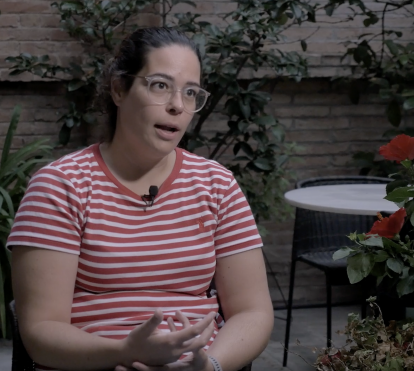
The visit to Root for Nature is not a one-off activity. It forms part of a systematic and carefully coordinated effort developed by Culture for All in close collaboration with the social programmes of the ”la Caixa” Foundation. The goal is clear: to make all the Foundation’s cultural and educational resources available to those who need them most, creating experiences that help improve their sense of wellbeing.
“We work with a great deal of active listening, adapting content and formats to the needs of each group,” explains the team behind the initiative. It is not just about opening the doors of institutions, but also about designing specific activities, providing support, and creating safe spaces where people can express themselves, connect with others and experience the transformative power of culture.
The benefits are well documented. According to several studies by the Social Observatory of the ”la Caixa” Foundation, cultural participation boosts creativity, improves health, supports personal growth and contributes to building more diverse, reflective and inclusive societies. On an individual level, culture makes us happier and strengthens our social capital.
For vulnerable groups such as carers – who spend 24 hours a day, seven days a week looking after another human being – these cultural experiences are not a form of entertainment, but a vital necessity. One of the few moments of self-care they have.
“At the School for Carers, we try to raise awareness that they can, from time to time, take a step back from their caring duties and devote some time to themselves, whether through the training workshops we offer, the support groups, or activities like today’s, where we try to bring culture closer as a right, not a luxury,” explains the psychologist.
“These spaces are what stop you from hitting rock bottom,” says Rosa, who looks after her mother, diagnosed with Alzheimer’s. “They allow you to take a step back, breathe, and remember that you have the right to live, and that way, you can care more wisely.”

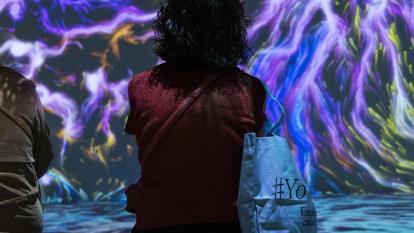
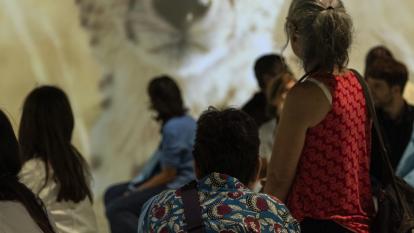
One of the great strengths of Culture for All is that it offers experiences designed for people going through similar situations. In the case of carers, many arrive with a deep sense of isolation and accumulated exhaustion. As Gutiérrez explains, “when they first get in touch with the School for Carers, they often feel lost and alone; and that loneliness often stems from real isolation.”
Taking part in an activity like this, in an inspiring cultural space and outside their usual routine, creates a profound sense of connection. Being with others who have lived through the same experiences allows them to relax, share without having to explain, and feel understood straight away. Sonia sums it up clearly: “When you’re with someone who’s been through the same thing, you don’t need to talk much. We share an emotional language.” For Rosa, being able to express herself without judgement is essential: “What isn’t said, festers inside.”
As the afternoon goes on, the conversations begin to flow naturally. Many of the participants agree that simply being there already makes a difference. “You’ve no idea how much good this is doing me,” says Mari Carmen, who had been quiet until then. Feeling welcomed and valued in a cultural space like CaixaForum is not just a moment of respite, it is an emotional lifeline. As the team from the ”la Caixa” Foundation confirm: culture, when experienced through respect and attentive listening, is a powerful tool for emotional release.
At the end of the afternoon, as the participants exchange contact details and say their goodbyes before returning to their routines, something has shifted. They leave carrying images that will stay with them. But above all, they carry a certainty: that they deserve spaces like this, that culture belongs to them too, and that enjoying it is not an act of escapism, but one of necessity and reconnection.
“I wish I’d discovered this sooner,” says Inma, with a mix of gratitude and nostalgia. Now in its seventh year, Culture for All will continue to build bridges between culture and the people who need it most. Because, as this afternoon at CaixaForum shows, art and creativity may not solve everyday problems, but they offer comfort and connection, and produce a sense of independence and wellbeing.